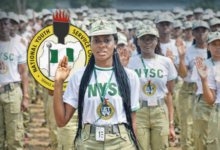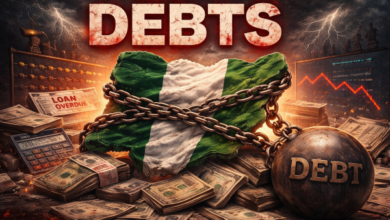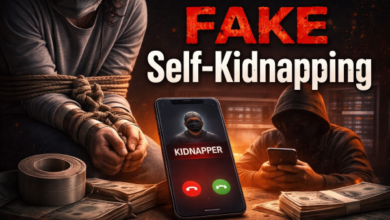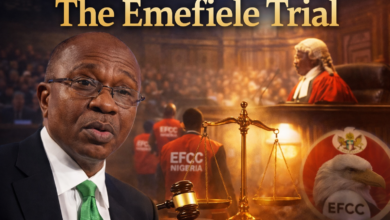BOKO HARAM: The Politics Of A Terror Brand
Without doubt, politicians across the divide have not done enough to cure the Boko Haram cancer. The situation on ground belies huge “Security Votes” which are usually unaccounted for by the federal and state governments. As the political blame game continues Shekau and his men continue to spread their gospel of fear and terror.
 It started like a joke. In fact it was initially dismissed by Nigerians high and low. Everyone quipped that “Nigerians cannot become terrorists, least of all become suicide bombers”. We all lived in the comfort zone of cushy denial. It would appear that our intelligence gathering agencies also joined this ‘popular opinion’ hall. After all, all other religious riots before Boko Haram like the one led by Alhaji Muhammadu Marwa Maitatsine had been summarily dealt with when it reared its ugly head in Kano in 1980. So when word first filtered out that about Boko Haram in 2009 in the Bauchi uprising which quickly escalated into a three-day insurrection in Maiduguri, many thought it would fizzle out like Maitatsine sect which gave Kano hell in the 1980s. It was therefore believed in many quarters that when Boko Haram’s original founder and leader, Mohammed Yusuf, was killed by agents of state albeit, illegally while in police custody, that his followers would quickly disperse to find other pastimes. We were dead wrong!
It started like a joke. In fact it was initially dismissed by Nigerians high and low. Everyone quipped that “Nigerians cannot become terrorists, least of all become suicide bombers”. We all lived in the comfort zone of cushy denial. It would appear that our intelligence gathering agencies also joined this ‘popular opinion’ hall. After all, all other religious riots before Boko Haram like the one led by Alhaji Muhammadu Marwa Maitatsine had been summarily dealt with when it reared its ugly head in Kano in 1980. So when word first filtered out that about Boko Haram in 2009 in the Bauchi uprising which quickly escalated into a three-day insurrection in Maiduguri, many thought it would fizzle out like Maitatsine sect which gave Kano hell in the 1980s. It was therefore believed in many quarters that when Boko Haram’s original founder and leader, Mohammed Yusuf, was killed by agents of state albeit, illegally while in police custody, that his followers would quickly disperse to find other pastimes. We were dead wrong!

The Congregation of the People of Tradition for Proselytism and Jihad (Jama’atu Ahlis Sunna Lidda’awati Wal-Jihad), or Boko Harām (its Hausa name) which means “Western education is sin” a war cry of its founder Mohammed Yusuf has since come to show Nigerians and, indeed, the world that it is no mean sect as it has redefined the meaning of insurgency in Nigeria, striking at the soul of the Nigerian nation-brand, laying the economy of many of Nigerian northern states prostrate, entrenching an unfettered regime of terror and decimating Nigeria’s military and civilian populations. Obviously, no one saw this coming.
Boko Haram says it wants to enforce pure Sharia law across Nigeria and stop Nigerians from receiving Western education; since the products and manifestations of Western education is ‘sin before Allah’. The group however does not feel or see any sin in killing, abducting and maiming innocent people, including children and women. Based in north eastern Nigeria, north Cameroon and Niger, Mohammed Yusuf’s Boko Haram is a bad dream leaders of the respective countries wish will simply go away. The only problem is that, this is a bad dream etched in stark reality. BRANDPOWER looks at the political dimensions of Nigeria’s unfortunate romance with terrorism and how it evolved into the menacing killing machine it has become today.
Abubakar Shekau. Monster to Nigerians, messiah and mentor to his followers. Enemy to the Nigerian military and security agencies, Allah’s warrior (jihadist) to his band of Islamic extremists. Terrorist extra-ordinaire to the Nigerian and (now) international authorities, lord and master in Sambisa forest and Nigeria’s border lines in the North-East. Love him or hate Abubakar Shekau is a man, a (negative) phenomenon any person will ignore at his own peril. The Nigerian Military aver that the Original Abubakar Shekau has been killed but the ‘current’ Ibrahim Shekau appears even more deadly than the ‘dead’ Shekau. It would appear that a flawless succession plan was put in place from inception for Boko Haram, extinguishing the sect has thus become a tall order since it is now an intricately organized terror organization.

Security issues has never be more politicized in Nigeria. Previously, while Boko Haram ravaged the land. The main opposition parties Action Congress of Nigeria (ACN) and Congress for Political Change (CPC) were unrelenting in their condemnation of the Goodluck Jonathan administration’s handling of the Boko Haram insurgency. The heavy criticisms have continued as both parties fused to become All Progressives Congress. The Presidency proscribed Boko Haram in 2013, the Opposition led by ACN clamoured for National Peace Summit. In June, 2013, Lai Mohammed as ACN publicity secretary had this to say about the government’s proscription of Boko Haram: “Against the background of insinuations in government circles, let us be clear that we do not condone the activities of these sects that have killed and maimed innocent Nigerians and turned a section of the country into a battle field. Terrorism in all its ramifications is condemnable, and no responsible government will allow any group, no matter its name, grievances or ideology, to carry out terrorist acts unchecked. But we believe that whatever action government takes – even in an emergency – must pass the Constitutional test, especially since the relevant sections of the Constitution have not been suspended’’
Lamenting the possible abuse of the proscription order Lai Mohammed continued: “By stifling the press, is the Order not abridging a part of the fundamental human rights guaranteed every citizen under Chapter Four of the Nigerian Constitution in Section 39 (1) which states thus: ‘Every person shall be entitled to freedom of expression, including freedom to hold opinions and to receive and impart ideas and information without interference? Can journalists escape being sentenced to 20-year jail terms for publishing statements issued by the sects? Can they freely report on videos periodically posted on YouTube by Boko Haram leader Shekau? Can the media freely report the kind of massacre that took place in Baga in April (2013) without being held liable for ‘supporting’ terrorism? Can radio and television stations organise talk shows on terrorism without the discussants being held liable for ‘supporting’ terrorism?”
“Can the opposition criticise the government’s strategies against the terrorist sects, through its regular intervention, without being perceived as offering support to the sects? Does this Order cover the satellite broadcast channels that can be accessed in many homes across the country? Who determines when this Order has been breached? These are some of the questions that arise under the proscription Order?
The ruling People’s Democratic Party (PDP) through their spokesman, Olisah Metuh, reacted swiftly by accusing ACN of supporting terrorism:“This deliberate distortion of facts clearly betrays ACN’s support for such groups as well as the heinous attempt to whittle efforts by the Federal Government and well-meaning Nigerians to end insurgency in the country.
“For the avoidance of doubt, no section of the order stifled the press; violated or seeks to violate any provision of the constitution. Instead the order reinforced the provisions of the constitution guaranteeing the security and welfare of all Nigerians.
The blame game has continued since the All Progressives Congress (APC) was formed. Only recently when there was a bomb blast in Nyanya, Abuja, PDP claimed that it was the handiwork of APC. The President himself , Dr. Goodluck Jonathan also recently accused the APC governors in the North-East of being behind the insurgency in their states. This is coming years after he also said that he had Boko Haram sponsors in his government.
However, in between all the accusations lies the fact that Boko Haram could not have become so larger than life if it did not have powerful backers. In July, 2011, An Arewa Consultative Forum leader, did not mince words when he pointedly accused politicians of creating the Boko Haram monster. Gen. Useni said: “I remember when I was the Deputy National Chairman of the ANPP, I went to the (Borno) state to commission some projects and when we were driving along one of the major streets, I saw young boys selling petrol in jerry cans and I asked him (then governor Modu Sheriff) why he allowed them, to be selling on a major road like that, and he said, “no, no, leave them; they are very useful. During general elections, we can use them to turn everything. So, that was how it all started. And if you remember, we had the same problem again in Rivers State where one of the former governors used thugs and at the end of it, they became militants.”
Also in November of the same year, the State Security Service (SSS) said at a press briefing that it had arrested Ali Sanda Umar Konduga who admitted to being one of the spokesmen of Boko Haram, using the name “Usman al-Zawahiri”. According to Marylin Ogar, SSS spokesperson, “He was a former political thug operating under a group widely known as ECOMOG,” ECOMOG was a militia group allegedly funded by politicians years ago in Borno State. Many of their former members graduated into Boko Haram. Konduga also implicated a serving Senator, Alli Ndume as being one of their sponsors. Senator Ndume has since been charged to court in November 2011. The case is still on.

This suspicion or conviction that local politicians have a hand in the Boko Haram saga in several quarters was perhaps responsible for President Jonathan’s initial casual approach to the Boko Haram challenge. Indeed, former President Olusegun Obasanjo was quoted recently as saying that for 18 days President Jonathan did not believe that over 200 girls were kidnapped in Chibok. The possible attitude being “you caused the problem, you solve it”. President Jonathan, in an interview also recalled that as Governor, he went to the creeks to meet with the militants himself, obviously wondering why the governors of Adamawa, Yobe and Bornu cannot do likewise. It took an escalation of the issue to global stage during the World Economic Forum for Africa (WEFA) held in Abuja, to get the Jonathan administration to give the sense of urgency and attention that the issue deserves. A frenzied global “#BRING BACK OUR GIRLS” has since been launched. It has also turned out that many girls and women have been and continue to be abducted by the sect members for use as domestic help and sex slaves. Though the girls have not been found, some keep returning on their own in trickles with tales of horror in the hands of their abductors (See story insert).

The state of emergency in Yobe, Borno and Adamawa states in place for about 14 months seem to have done precious little to check the excesses of Boko Haram. If anything, the attacks have become more vicious and frequent. The military is currently in turmoil as they keep losing men to the faceless enemy. The rank and file seem to be very low on morale even as there was a reported case of mutiny against a commanding officer. This happened with soldiers from the newly formed 7th Division of the Nigerian Army against Major General Abubakar Mohammed, their General Officer Commanding at Maimalari Barracks, which is also home to the Artillery Corps. He was also reportedly shot at. The outcome of the internal investigations is yet to be made public but General Muhammed has since been replaced.
Without doubt, politicians across the divide have not done enough to cure the Boko Haram cancer. The situation on ground belies huge “Security Votes” which are usually unaccounted for by the federal and state governments. As the political blame game continues Shekau and his men continue to spread their gospel of fear and terror. It is clear that winning the debate on who is sponsoring Boko Haram is nothing; what is important is for all leaders: political; civil; traditional; socio-cultural and economic need to close ranks and fight this common enemy. By now it is clear for all to see that Boko Haram serves no good to anyone. The economic and social hemorrhage is deadly. Nigeria needs to be rescued, urgently.
BRANDPOWER COVER STORY
My Horrific Boko Haram Experience – Escaped Abuctee
 In this exclusive interview, IQ4News’ Prince Dickson spoke with Meenah Dawah, a teenage girl abducted by Boko Haram for 27 months.
In this exclusive interview, IQ4News’ Prince Dickson spoke with Meenah Dawah, a teenage girl abducted by Boko Haram for 27 months.
Meenah, who escaped when the Nigerian army attacked a Boko Haram camp early this year, was just 17 years old when she was forced to watch her parents being shot dead by the Boko Haram insurgents in her village in Konduga town, northern Nigeria. She escaped after 27 months with a baby she claims may belong to the Boko Haram leader Abubakar Shekau.
As a person who has seen torture, rape and abuse, Meenah has learned quickly to hold her tongue even in the face of appalling acts of atrocity. While in captivity, she had to care for children born to Boko Haram commanders and members, and would tremble in fear as she heard girls scream as they were raped, and in some cases watch how girls were tortured for refusing to change their faith.
She described how on occasions some top leaders of Boko Haram would come, and she was asked to entertain them. It was on such visits she insists that Abubakar Shekau, Nigeria’s most wanted man, and Boko Haram leader, slept with her.
“He would just appear from nowhere like a ghost,” she narrated. “He seems to be panicking all the time and issuing instructions.
“He is a softly spoken man – it is almost as if he whispers, if you are meeting him for the first time, you would never be scared of him. “But I soon learned that after every whisper something dangerous would happen somewhere in Nigeria.
“Depending on the camp, some of the camps have everything, electricity, water and television, with different kind of electronics. “He once asked me if I was willing to fight for the cause, to which I answered no; he told me I could be a fighter and a domestic slave.
“I didn’t want to speak to him in case what I said offended him. “All it would take was one wrong word and he would have had me killed. I thought he was drinking or taking something whenever he came, one could notice maybe he lost men or something was not right.
“We moved a lot and depending on the camp, my role varied, it was so tough travelling around with a baby strapped to my back. “Abu has many kids from many different women.
“Some of us women would go to Maiduguri to buy things when we have shortage, and a commander or two would follow us, and we acted as decoy when villages are ambushed. “I’d be sent in to talk to people, then they’d move in behind me and start killing.”
“Some of us girls would also have to carry guns, and often bombs too, there was this girl, she was forced to carry a rocket-propelled grenade launcher on her shoulder, then we had few men in that particular camp.”
Meenah managed to escape when she was badly wounded by a bullet, after the Nigerian army attacked their camp. She was left for dead. The bullet in her leg was only recently removed at the University of Maiduguri Teaching Hospital in Borno State.
She has an uncle as a sole surviving relative, and it has not been easy as her uncle has not receive her warmly. “My uncle will not have me because he is ashamed of my child whose paternity is not only questionable but is dangerous if it is Shekau,” she says.
 Many like Meenah have nowhere else to turn.“Before my parents were shot in the attack on our village, my dad had made plans for me to go and finish my secondary school in Government Girl Secondary School Shaffa, where we have a distant relative, but she was also killed in an attack on her way back from a market in that area.
Many like Meenah have nowhere else to turn.“Before my parents were shot in the attack on our village, my dad had made plans for me to go and finish my secondary school in Government Girl Secondary School Shaffa, where we have a distant relative, but she was also killed in an attack on her way back from a market in that area.
“I know I am intelligent and willing to learn, but where do I start from?”
Culled from IQ4 News










